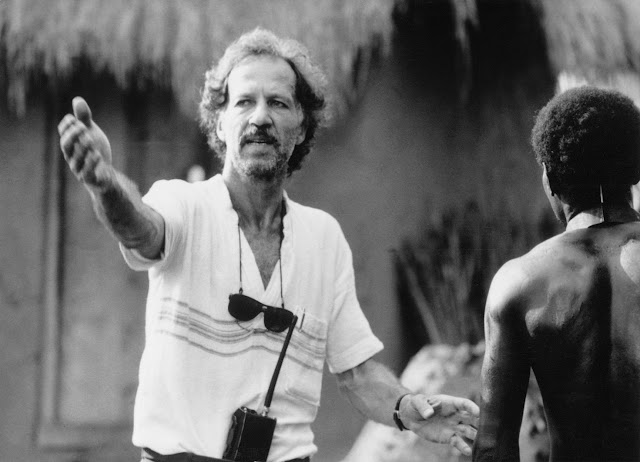Interview with the Bavarian filmmaker

The conversation is available to read at the Time Magazine website, or to watch as an online video, in which you can see the austere but affable European director speaking candidly with his chirpy and enthusiastic interviewer:
As you were poring over your memories, were there things you had forgotten, or that you now found particularly fascinating or traumatizing to experience all over again?
Many things I had forgotten, yes. Traumatizing, no, I wouldn't say that. I have enough stability inside of me to not be traumatized. If I were a solider I would not be the one to come back with Post-Traumatic Stress Disorder because I think I have fortified myself with enough philosophy.
Reading your stories, I was reminded of the problems Francis Ford Coppola faced with Apocalypse Now. You say at one point in the book that you were flat broke and that you traded two bottles of shampoo for four kilos of rice. Is that the low point?
The distinction between Apocalypse Now and my film is that Coppola always resolved films with ready cash. There was always a lot of money flowing around. In my case, because I had to produce the film myself, I was down to the utmost limit. So I lived in a chicken coop and had nothing to eat any more. But I remembered from Miami I had two bottles of shampoo — well one was shampoo and the other was conditioner — and I traded it at the local market for four kilos of rice and I ate rice for three or four weeks. That's how I survived. No one can imagine how far down I was sometimes.
Was that the low point?
There were lower points because there were more dramatic events, like if you're building a camp for 1,100 people in the middle of the jungle and a border war breaks out and local people attack your camp and burn it to the ground. That's a serious sort of thing. Besides that, there were accusations that I was committing human rights abuses — which were all fabricated — and a tribunal was set up against me. These things are hard to handle and of course I still feel the pain.
It's also what makes the book quite dramatic. I'm wondering if you're too close to the book to really appreciate how shocking these revelations are.
That's probably the reason I couldn't touch it for over 20 years, and my own wife who knows me well only managed to read up to page 80 and cannot continue. It's so hard for her to take what I have gone through...it's something which deeply touched my existence.


